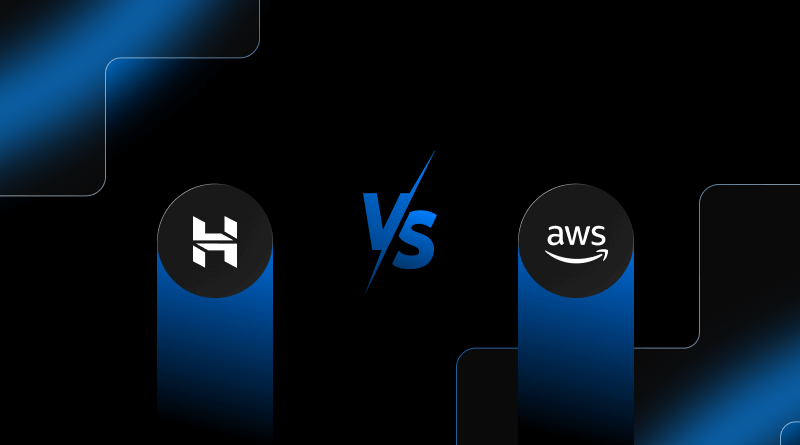Launching a website can feel like stepping into a maze without a map. You know there are choices around every corner, each claiming to be the “best web hosting provider.” Two names that come up repeatedly are Hostinger vs AWS (Amazon Web Services). One promises speed and simplicity; the other promises power and flexibility. But which one actually fits your needs?
The reality is, hosting is not all about uptime or the speed of the server. It’s about how much time you want to spend fiddling with technical stuff, how comfortable you are with computers, and where you see your website going. Pick the wrong one, and your website can become a daily headache. Pick the right one, and it just works—smooth, effortless, almost invisible.
In this guide, we’ll walk you through everything from beginner experiences to small website needs, ease of use, performance, cost, and even hosting smaller businesses. By the end, you’ll have a clear idea of which platform works best for you.
Table Of Content
First-Time Hosting? Keep It Simple
If it’s your first website, the first impression matters a lot. Nothing kills excitement faster than a confusing dashboard or setup process. This is where Hostinger vs AWS for beginners truly shows the gap.
Hostinger simplifies things. Sign up, and the dashboard is clean and intuitive. Installing WordPress is one click. Managing emails, business domains, SSL certificates, and backups? All handled within minutes. Even a total beginner can have a live website in a few hours.
AWS, however, is similar to an engineer’s toolkit. It’s powerful, it’s mighty, but even the smallest website takes a bunch of setup:
- Selecting the proper EC2 instance
- Configuring storage or S3 buckets
- Setting up security rules
- Working with networking and DNS
Even AWS Lightsail, which is supposed to simplify things, still expects some technical knowledge.
Scenario: A freelance designer needs a portfolio up online by the weekend. With Hostinger, it’s live within hours. With AWS, they’re still figuring out which server type to pick while reading guides and scratching their head.
Tip: Good support saves time. With Hostinger, the team actually guides you through setup and fixes, so you’re not left guessing or stuck. AWS support is extensive; however, it may feel overwhelming at times if you’re not familiar with the details.
Takeaway: If you want things fast and hassle-free, Hostinger is the clear winner. AWS is superior if you are willing to learn about advanced cloud infrastructure and are okay with trial and error.
Hosting That Lets Small Businesses Focus on Growth
Running a small business is balancing a million things at once. Your hosting shouldn’t add more stress. In the debate of Hostinger vs AWS for small business, it’s easy to see the difference: one makes running your website simple, the other hands you full control.
Hostinger’s shared, cloud, and VPS plans are designed for small businesses. Automatic backups, SSL, and helpful support let business owners spend their time running the business rather than dealing with server issues.
AWS is powerful and can scale for big traffic, custom applications, and complex workflows. However, that power comes with responsibility. Without technical skills or an in-house IT staff, hours of time are wasted on monitoring the servers.
Scenario: A small online store can run smoothly on Hostinger, with WooCommerce, caching, and backups all taken care of—no technical efforts required. On AWS, someone needs to monitor server metrics, adjust instances, and manage database scaling—one misstep can slow down the website.
Additional insight: AWS can scale impressively, but most small businesses don’t need that much complexity right away. Hostinger offers almost everything that is needed for keeping your website up and running. If you’re considering the best Hostinger alternative, MilesWeb offers the same reliability with added flexibility and scalability.
Bottom line: Hostinger is practical and low-stress. AWS works if you expect rapid growth or need custom setups.
The Dashboard Experience: How Easy Is It?
A platform’s ease of use makes all the difference, especially when comparing Hostinger vs AWS ease of use for day-to-day website tasks.
Hostinger is intuitive. Domains, emails, and SSL certificates are easy to manage. One-click WordPress installation, clear guides, and an uncluttered interface make it approachable. Even troubleshooting is straightforward.
AWS is like a complex control panel with endless settings. Complete control over servers, storage, networking, and security is wonderful—but only if you know what each option does. Lightsail makes it easier, but you still must know some cloud fundamentals.
Scenario: A marketing consultant is eager to go live with a blog. Hostinger allows them to go live without adjusting server settings. AWS requires reading manuals, changing instances, and checking permissions twice.
Bottom line: Hostinger is perfect for users who prefer a ready-to-go hosting setup, with automated backups, pre-configured WordPress optimization, and minimal manual management. AWS is for those who enjoy customizing and managing every detail.
Speed, Uptime, and Performance
Performance affects user experience, retention, and SEO. The Hostinger vs AWS performance comparison shows two very different approaches.
Hostinger servers are set up to run WordPress and other popular CMSs smoothly. With LiteSpeed caching and data centers around the world, sites load quickly and can handle regular traffic without extra tweaks.
AWS allows fine-tuning for almost any workload. You can choose instances, storage, and network configurations to handle spikes, resource-heavy apps, or high traffic. The catch: you must manage these actively.
Scenario: Hostinger is a car tuned and ready to drive. AWS is a racecar—you can push it hard, but only if you have the knowledge to fine-tune the engine, brakes, and suspension.
Bottom line: Hostinger works reliably and handles most websites without causing any hassle. AWS is unbeatable for heavy-duty workloads but needs active management.
Small Websites on the Cloud: Can AWS Work?
Most think AWS is merely for large projects. However, it is possible for small websites to work on it, but the setup is not plug-and-play. Servers, storage, network, and security must all be configured. However, AWS for small website hosting has improved through tools like Lightsail.
AWS Lightsail simplifies small website hosting with preconfigured WordPress instances. MilesWeb offers fully managed AWS hosting, letting beginners and small business owners use AWS without dealing with the technical headaches.
Scenario: Someone wants to start a personal blog. Hostinger gets them live in a few hours. AWS works too, but only through Lightsail or managed hosting—otherwise, they must understand storage, networking, and instance types.
Bottom line: For small websites, Hostinger is faster and simpler. AWS works if you want flexibility or managed services.
Predictable Plans vs Pay-As-You-Go
Pricing is another big difference. The Hostinger vs AWS pricing debate often comes down to stability versus flexibility.
Hostinger combines hosting, emails, SSL, and support in one plan. Everything’s clear, so you just set it up and get going.
AWS charges pay-as-you-go. Compute hours, storage, bandwidth, and other resources to determine your bill. Low usage is cost-effective, but unexpected spikes can increase bills quickly.
Scenario: A small host on Hostinger understands exactly how much they will be paying each month. On AWS, even a minor last-minute surge in traffic or extra storage can drive up the bill unless kept in check. This creates a clear difference between AWS vs Hostinger cost management.
Bottom line: Hostinger is easy and predictable. AWS is scalable and flexible, but demands careful handling.
Making the Right Choice
Here’s a practical breakdown:
- Beginners: Hostinger is quick to use; AWS takes more time to learn.
- Small businesses: Hostinger is stable; AWS is suitable for scalable, bespoke configurations.
- Ease of use: Hostinger is user-friendly; AWS requires effort.
- Performance: Hostinger works out of the box; AWS performs well under heavy loads.
- Pricing: Hostinger is cost-effective; AWS is flexible but needs monitoring.
- Small websites: Hostinger is simple; AWS Elastic, but requires constant monitoring.
Real-World Perspective: When Hosting Choices Shape Experience
When you actually start using hosting every day, the difference becomes clear. With Hostinger, you don’t spend your morning figuring things out—it logs in, updates your website, and gets on with your day. Everything feels simple and steady. AWS, though, can feel like a project on its own. You learn things as you go—tweaking settings, checking configurations, fixing what breaks, and sometimes feeling proud once everything works.
That’s really what it comes down to: what kind of person you are. If you’d rather not think about servers and just want your website to run, Hostinger feels effortless. If you enjoy control, customization, and solving problems, AWS gives you all the room you need. You’ll know you picked the right web host when you stop thinking about it and just get to work.
Hostinger vs AWS is all about which one you can actually handle on a daily basis, not which one everyone else talks about.
– Hostinger is simple, dependable, and fast. It’s ideal for beginners, small businesses, personal projects, and blogs.
– AWS is great if you want full control and growth options, but you’ll need technical skills or managed services like MilesWeb to make it work.
The ideal hosting allows you to concentrate on your business and website, not fighting servers. Choose the one that suits your workflow, and your online presence will flourish.
FAQs
1. Which is better for a beginner: Hostinger or AWS?
For someone just starting out, Hostinger feels natural. You sign up, click a few things, and the website’s ready. AWS, though powerful, asks you to think like an engineer from the first step. Unless you’re curious about how servers work under the hood, you’ll find Hostinger much easier to get along with in the Hostinger vs AWS for beginners debate.
2. Can I host a simple WordPress website on AWS, or is Hostinger better for that?
You can set up WordPress on AWS, but it’s not fun if you’ve never done it before. There’s setup, permissions, storage, and all that backend stuff. Hostinger just asks what you want to build and takes care of the rest. For most people, especially with a small blog or portfolio, Hostinger vs AWS isn’t even a question—Hostinger saves time and stress.
3. Which service is better for a small business website or a personal blog?
For small businesses, Hostinger is the safer bet. It handles backups, SSL, and updates without you needing to touch anything. AWS can handle massive traffic, but most small teams don’t need that level of setup.
4. Which is cheaper, Hostinger or AWS?
Hostinger is easier to plan around. You pay a fixed amount, and that’s it. AWS works on usage-based pricing, which sounds nice until a sudden traffic jump doubles your bill. If you prefer stability, Hostinger vs AWS pricing goes in Hostinger’s favor every time.














